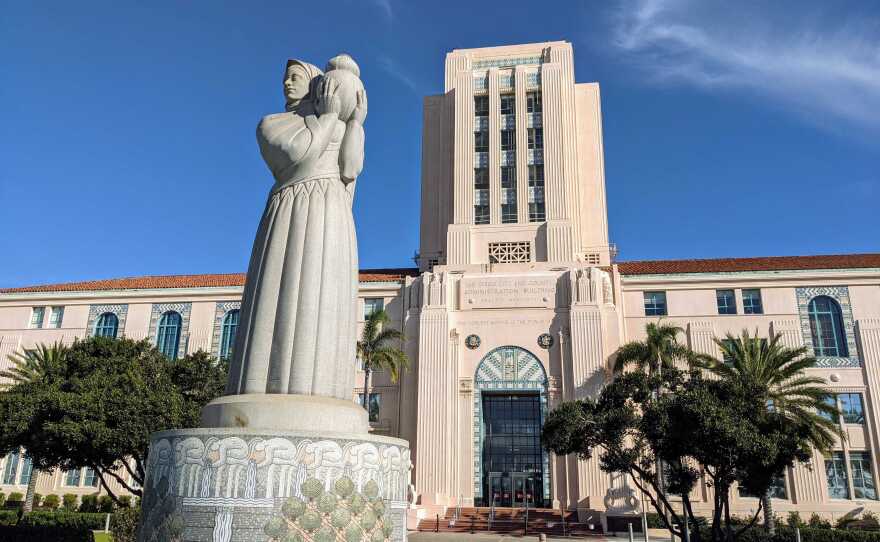After a lengthy public hearing, the San Diego County Board of Supervisors voted 3-2 Tuesday to give final approval to an ordinance based on a United Nations treaty aimed at eliminating discrimination against women — and those who identify as women.
Most residents who spoke at the meeting were opposed to the county adopting the Convention on the Elimination of All Forms of Discrimination, and at one point, the meeting was paused for an hour because of a disruption caused by two opponents.
According to the ordinance, "`women and girls" shall mean those who identify as women and girls, including transgender women and gender non- conforming, and those assigned female at birth who include non-binary, transgender men and intersex communities.
"`Gender' shall mean the characteristics of women, men, girls, and boys that are socially constructed. As a social construct, gender can vary among cultures and can change over time," the ordinance states.
Most opponents of the ordinance cited religious or safety concerns, while proponents insisted the ordinance wouldn't override federal or state laws or water down any existing protections.
Supervisors Nathan Fletcher, Terra Lawson-Remer and Nora Vargas voted in favor, while Joel Anderson and Jim Desmond were opposed.
According to the ordinance, multiple forms of discrimination "compound to disadvantage and oppress women, including race, ethnicity, immigration status, disability, familial status and age."
"The extent to which women and girls experience inequities impact their overall wellbeing and economic stability; and adoption of a CEDAW ordinance at the county level will help achieve gender equity and remove barriers faced by women and girls within the county, including in the areas of economic development, the criminal legal system, voting rights, civic engagement, health care, gender-based violence and harassment, housing and homelessness," according to the document.
Along with featuring guidance on topics including economic development, the criminal legal system, health care, and gender-based violence and harassment, the ordinance defines what constitutes discrimination against women and girls.
During its April 26 meeting, supervisors also voted 3-2 — with Anderson and Desmond opposed — to give initial approval to the ordinance.
The board last November unanimously approved the development of an ordinance based on the United Nations' CEDAW, which was first adopted in 1979. President Jimmy Carter signed CEDAW in July 1980, but it was never brought to the U.S. Senate for a vote.
County officials said only the United States, Iran and Somalia have not ratified the CEDAW. However, several cities and counties, including Los Angeles and San Francisco, have adopted ordinances that reflect its principles.
Fletcher, the board chairman, said Tuesday's decision wouldn't change opponents' minds, but residents who feel different should know "that the county loves and cares about them."
"Equality has never been easy, but we have to continue to do this," Fletcher added.
Vargas, board vice chair, said CEDAW offers strategies and measures to end discrimination and promote gender justice. Vargas said that it was "disturbing to hear all the misinformation" from opponents.
She added that as someone who studied under the Jesuits, one of the core values she learned was to ensure that "I do everything in my power to ensure a culture of service."
Desmond, however, said that while the original CEDAW "is as good today as it was in 1979," it doesn't have a distinct definition of men and women. He said rights are not absolute, including for speech, gun use and property ownership.
Both transgender men and biological women have rights, "and we've yet to find a way to balance those rights," Desmond said, adding he couldn't support the county's version of CEDAW.
Anderson said his office has received questions and concerns about the CEDAW ordinance, and he was concerned about how the ordinance would affect Title IX, a federal law that prohibits sex-based discrimination in any school or educational program that receives federal money.
Anderson also said he was concerned women could be placed in jail with transgender inmates, and that in the wrong hands, the ordinance language could be weaponized.
"We can't lift others by stepping on the women in our lives today," he added. "I can't support this today, but will work to ensure that everyone's treated fairly."
Around 75 people spoke on the ordinance during a public comment period that lasted over two hours. Gail Levin, a minister with the Salt & Light Council, a private religious group, asked if the board was prepared for the backlash the CEDAW would bring.
"Your ordinance will basically make women disappear," she said, if there are no firm definitions of what a woman is.
Jenni Prisk, former chairwoman of the county Commission on the Status of Women and Girls, spoke of favor of CEDAW becoming official policy.
"Just as suffragettes fought and won for the right for women to vote in 1920, so we are fighting today to continue their legacy," Prisk said, adding that women need protection and empowerment.
At one point during public comment, a woman reading a statement in opposition refused to leave the podium after her allotted speaking time was up.
After several warnings, Fletcher asked deputies to remove her and another woman who was disrupting the meeting. Shortly after 1:30 p.m., Fletcher recessed the meeting, which resumed at 2:42 p.m.








